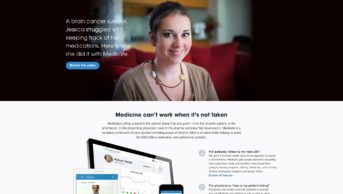
Shutterstock.com
Negative press coverage about statins has been linked to patients deciding to stop taking their statin therapy too early, researchers warn.
Discontinuing statin therapy, which lowers blood cholesterol levels, at an early stage is associated with an increased risk of heart attacks and dying from heart disease, say researchers led by Børge Nordestgaard, chief physician in clinical biochemistry at Copenhagen University Hospital.
The development of side effects, such as muscle aches and other forms of discomfort, has been reported by 10-29% of statin users, the study says, and up to 65% of former statin patients have cited these symptoms as the reason for discontinuing therapy.
“People who stop statins early have a 26% increased risk of a heart attack and an 18% increased risk of dying from cardiovascular disease when compared to people who continue to use them,” says Nordestgaard, whose nationwide prospective study[1]
of all statin users in Denmark was published on 2 December 2015.
“We found that exposure to negative news stories about statins was linked to [patients] stopping statin [treatment] early and explained 2% of all heart attacks and 1% of all deaths from cardiovascular disease associated with early discontinuation of statins,” he adds.
Of 1,931 transcripts of Danish radio, television, websites and news bureau feeds mentioning or reporting on statins from 1990 onwards, researchers graded 110 as ‘negative’ news stories, 1,090 as ‘neutral’ and 731 as ‘positive’, but the study does not elaborate on what the transcriptions say about the treatment.
Nordestgaard does caution that while he thinks it is likely, it is not possible to say for sure that negative press about statins causes the early discontinuation of treatment. “Although this type of association research cannot prove causality, our data suggest that early discontinuation of statins leads to unnecessary heart attacks and deaths from cardiovascular disease,” he says.
The researchers studied 674,900 people in Denmark aged 40 years or older who had started taking statins between 1995 and 2010, and followed them until the end of 2011. Individuals taking statins increased from <1% of the entire Danish population in 1995 to 11% in 2010. Early statin discontinuation increased from 6% in 1995 to 18% in 2010.
They found that early statin discontinuation increased following the publication of negative statin-related news stories, and also said drug discontinuation increases in patients living in cities, being male, and being an ethnicity other than Danish.
“We have known that adherence to statins can be poor as many patients do not feel the immediate benefits of taking statins, but do feel any side effects,” says Sotiris Antoniou, consultant pharmacist in cardiovascular medicine at Barts Health NHS Trust, which operates in central and east London. “Coupled with negative news stories, it’s perhaps not surprising that some people stop taking them.”
The impact of stopping therapy, however, with the increased risk of heart attack and death from cardiovascular disease, is worth emphasising, he says.
“This study highlights the integral role that pharmacists can play in supporting patients to understand the benefits of therapy, and to outweigh any concerns an individual may have, to support the long-term adherence,” says Antoniou.
Nordestgaard says the findings suggest a need for protocols aimed at increasing early adherence to statin therapy. Exposure to both negative and positive statin-related news stories early in a patient’s therapy may play a role for the patient in the decision to continue or discontinue statin therapy, he says. This may especially be true for a patient without a history of cardiovascular disease or diabetes, who thought they were in good cardiovascular health.
Peter Weissberg, medical director at the British Heart Foundation, says: “This interesting study raises important questions about how people make decisions that affect their health and the consequences of those decisions. It is important for patients that their doctors base their advice on objective interpretation of the best evidence available rather than biased reports in the lay and medical press.”
References
[1] Nielsen SF and Nordestgaard BG. Negative statin-related news stories decreasestatin persistence and increase myocardial infarction and cardiovascular mortality:a nationwide prospective cohort study. European Heart Journal (online, 2 December 2015) doi:10.1093/eurheartj/ehv641


